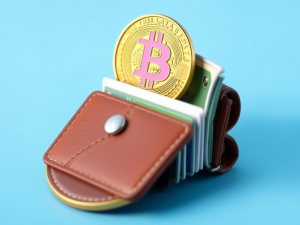
Select a cryptocurrency wallet that aligns with your trading needs by focusing on key features such as security, access to public and private keys, and backup options. A wallet's primary function is to store your digital assets securely while providing easy access when needed.
Consider wallets that offer robust security measures, including two-factor authentication and encryption. Both public and private keys play critical roles in managing your assets; ensure the wallet you choose allows you to control these keys effectively. This control minimizes risks associated with third-party services.
Evaluate the backup options available within the wallet. Regular backups are essential for safeguarding against data loss or theft. Look for wallets that allow you to create encrypted backup files or seed phrases, ensuring that you can restore access to your funds if necessary.
The right cryptocurrency wallet can significantly influence your trading experience. Prioritize features that enhance both security and accessibility while aligning with your personal trading strategy.
Assessing Security Features
Prioritize wallets that offer two-factor authentication (2FA) for added protection during trading. This feature requires a second form of verification, significantly reducing unauthorized access risks.
Examine the private key management capabilities. A wallet that allows users to control their private keys ensures that you maintain ownership of your cryptocurrency assets. Avoid wallets that store private keys on centralized servers, as this increases vulnerability.
Look for wallets with robust backup options. Ensure that the wallet provides easy methods to back up your data, such as seed phrases or recovery keys, which can restore your access in case of device loss or failure.
Check whether the wallet incorporates multi-signature functionality. This feature requires multiple signatures before any transaction is executed, enhancing security by distributing control among different parties.
Evaluate the reputation and track record of the wallet provider. Research any history of security breaches and how they were addressed. A transparent provider with a strong commitment to security is preferable.
Consider wallets that include real-time alerts for transactions and access attempts. Notifications help monitor any unusual activities, allowing for prompt responses to potential threats.
Finally, ensure regular software updates are part of the wallet's maintenance routine. Frequent updates often patch vulnerabilities and enhance overall security features essential for safe trading practices.
Understanding Wallet Types
For trading purposes, selecting the appropriate cryptocurrency wallet hinges on understanding the different types available and their specific features. The primary categories include hardware wallets, software wallets, and paper wallets.
Hardware wallets provide robust security by storing private keys offline. This minimizes exposure to online threats, making them ideal for holding significant amounts of cryptocurrency. Ensure your choice supports multiple cryptocurrencies and has a clear backup process.
Software wallets are divided into desktop, mobile, and web-based solutions. Desktop wallets offer enhanced security compared to web wallets but require diligent updates to protect against vulnerabilities. Mobile wallets prioritize convenience, enabling quick access for trading on-the-go. Web wallets are accessible from any browser but often lack strong security measures; opt for reputable providers with strong encryption and two-factor authentication.
Paper wallets represent another storage option by allowing users to generate a pair of keys offline. This method is highly secure against online attacks but requires careful handling to prevent physical loss or damage. Always create backups in multiple secure locations.
Your choice should align with your trading frequency and the amount of cryptocurrency you intend to hold. For active trading, consider software wallets that combine speed with adequate security features. If long-term storage is your goal, hardware or paper wallets will be more suitable.
Evaluating User Experience
Focus on wallets that offer intuitive interfaces, allowing seamless access to trading features. A well-designed wallet simplifies storage and transaction processes, enhancing the overall user experience.
Check for mobile compatibility, as many traders prefer managing their cryptocurrency on-the-go. Ensure the wallet supports both public and private key management without complicated steps, which can hinder quick trading decisions.
Examine customer support options; responsive assistance is critical for resolving issues that may arise during trading. Wallets with comprehensive FAQs and live chat features can greatly improve user satisfaction.
Consider customization options within the wallet. The ability to personalize settings and notifications helps users stay informed about market changes and security alerts relevant to their trades.
User reviews provide valuable insights into real-world experiences. Assess feedback regarding the wallet’s performance during high-traffic periods or major market events, as reliability under pressure is essential for effective trading.
Lastly, ensure that the wallet integrates easily with popular exchanges, facilitating straightforward transfers between your storage solution and trading platforms. This integration streamlines operations and minimizes delays in executing trades.
Comparing Transaction Fees
To maximize profitability in trading, understanding transaction fees across different wallets is imperative. Here are key aspects to consider:
- Fee Structures:
- Fixed Fees: Some wallets charge a constant fee per transaction, regardless of the amount transferred. This can be advantageous for smaller transactions.
- Variable Fees: Other wallets apply fees based on network demand or transaction size, which may fluctuate significantly during peak periods.
- Blockchain Selection: Different cryptocurrencies have varying fee structures. For instance:
- Bitcoin typically incurs higher fees during congestion.
- Ethereum fees vary based on gas prices, influenced by network activity.
- Wallet Features Affecting Fees:
- Priority Settings: Some wallets allow users to set transaction priority, affecting speed and cost.
- Batched Transactions: Wallets that support batching can lower costs by combining multiple transactions into one.
- User Incentives: Certain platforms offer reduced fees for using their native tokens or promoting trading activities within their ecosystem.
A comprehensive analysis of these factors will provide clarity on how wallet choices directly impact trading expenses. Evaluating each wallet's fee structure against your trading habits is essential for optimizing your cryptocurrency strategy.

You can be the first!